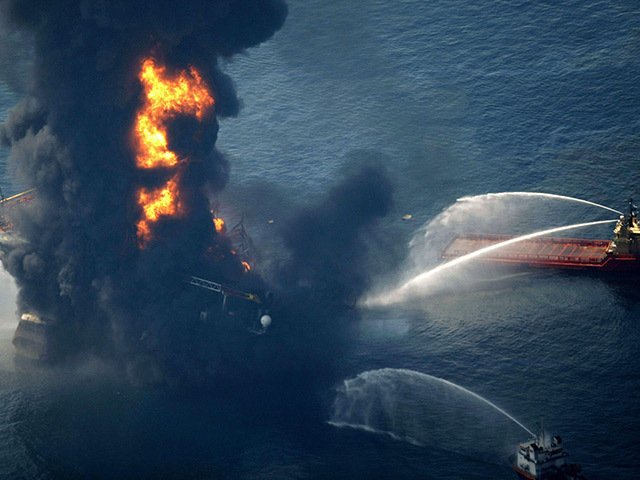
BP Plc asked a U.S. appeals court to undo payments to some victims of the 2010 Gulf of Mexico oil spill in a move opposing lawyers said might open the floodgates to hundreds of thousands of individual damage-claim awards.
BP, which is struggling to hold down the estimated $9.2 billion cost of its settlement of most private damage claims, told the U.S. Court of Appeals in New Orleans today that the administrator of its settlement program misunderstood the deal. As a result, a handful of nonprofit agencies that didn’t suffer any losses from the spill were paid hundreds of thousands of dollars, BP contends.
BP asked the three-judge panel to review the individual awards after being rejected by the lower-court judge.
“The district court refused to allow BP to follow normal procedures,” Thomas Hungar, BP’s attorney, told the judges.
Victims’ lawyers accused BP of using the nonprofits as a test for winning appeals-court review of individual damage awards and rewriting the settlement. The accord doesn’t permit appellate review of individual claim resolutions, they said. They urged the judges to wait until the settlement is concluded to decide the issue and not let BP appeal one claim at a time.
“You should not hear piecemeal litigation,” Samuel Issacharoff, a lawyer for the victims, told the judges. “Some day all of these claims will be resolved, and then they will be reviewable.”
Circuit Judge Edward C. Prado asked BP whether claimants dissatisfied with their payments could also complain to the appellate court. Hungar replied that victims can’t appeal if they’ve signed the release form required for payment.
Victims’ lawyers countered that BP is trying to subvert the settlement program and appeal “literally thousands of claimant awards directly to this court at its will,” according to court papers. “The possibility of a flood of cases” being appealed directly to the appellate court would undermine “the very purpose behind class settlement agreements,” which are designed to avoid individual litigation, they argued. “If this court was to rule that there’s a right to appeal to this court, do you have any idea how much additional litigation it would mean?” the judge asked Hungar. He replied that the number of appeals would be minimal.
Thousands of people and businesses harmed by the worst offshore spill in U.S. history sued BP and its subcontractors. BP previously set aside $43 billion to cover all costs of the spill and has already paid more than $28 billion in spill response, cleanup costs and damages.
The trial judge overseeing the suits ruled last month that BP acted with gross negligence in causing the spill, a decision exposing the company to as much as $18 billion in fines. BP today challenged the loss-calculation formula for the nonprofits, each of which received fewer grants and donations after the spill than before it.
Such miscalculations treated the grants and donations as business revenue, violating settlement terms intended to “allow recovery only for actual lost profits by business claimants,” Geoff Morrell, a spokesman for the London-based company, said in an e-mailed statement. The court’s ruling “implicates awards involving tens of millions of dollars,” he said.
BP has complained in several courts that the company is being forced to pay hundreds of millions of dollars for claims it never intended to be covered by the settlement. The company has asked the U.S. Supreme Court to review the settlement to see which interpretation is right. The high court hasn’t said whether it will hear that case.
BP previously made similar arguments to U.S. District Judge Carl Barbier in New Orleans, and to two three-judge appeals panels. Except for requiring a proper matching of claimants’ revenues and expenses for settlement calculation, the courts have told BP it must live with its deal.
The settlement provides an internal appeal process, which lets either side take disputes to Barbier, who can decide whether to review them. His decision is final under the agreement, victims’ lawyers contend.
BP disagrees.
“The settlement agreement contains no provision waiving BP’s right to appeal, and the law is clear that parties to a settlement do not waive their right to appeal unless they clearly and unequivocally abandon that right,” the company’s lawyers said court papers.
The cases are In Re. Deepwater Horizon, 13-30843, 13-31299, 13-31296 and 13-31302, U.S. Court of Appeals for the Fifth Circuit (New Orleans). The lower-court case is In re Oil Spill by the Oil Rig Deepwater Horizon in the Gulf of Mexico on April 20, 2010, MDL-2179, U.S. District Court, Eastern District of Louisiana (New Orleans).